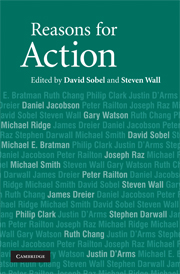Book contents
- Frontmatter
- Contents
- Notes on the contributors
- Acknowledgments
- 1 Introduction
- 2 Intention, belief, and instrumental rationality
- 3 Reasons: practical and adaptive
- 4 The explanatory role of being rational
- 5 Practical competence and fluent agency
- 6 Practical conditionals
- 7 Authority and second-personal reasons for acting
- 8 Promises, reasons, and normative powers
- 9 Regret and irrational action
- 10 Mackie's motivational argument
- 11 The truth in Ecumenical Expressivism
- 12 Voluntarist reasons and the sources of normativity
- Bibliography
- Index
7 - Authority and second-personal reasons for acting
Published online by Cambridge University Press: 05 May 2010
- Frontmatter
- Contents
- Notes on the contributors
- Acknowledgments
- 1 Introduction
- 2 Intention, belief, and instrumental rationality
- 3 Reasons: practical and adaptive
- 4 The explanatory role of being rational
- 5 Practical competence and fluent agency
- 6 Practical conditionals
- 7 Authority and second-personal reasons for acting
- 8 Promises, reasons, and normative powers
- 9 Regret and irrational action
- 10 Mackie's motivational argument
- 11 The truth in Ecumenical Expressivism
- 12 Voluntarist reasons and the sources of normativity
- Bibliography
- Index
Summary
In The Second-Person Standpoint, I argue that a distinctive kind of reason for acting, a second-personal reason, is an ineliminable aspect of many central moral categories, including rights, moral responsibility, moral obligation, respect for and the dignity of persons, and the very concept of moral agent or person itself. Second-personal reasons are distinguished from reasons of other kinds by their conceptual relations to authoritative claims and demands that must be able to be addressed to those to whom they apply (second-personally, as it were). I have argued, more specifically, that there are four interdefinable, irreducibly second-personal notions: the authority to make a claim or demand, a valid (authoritative) claim or demand, responsibility to someone (with the relevant authority), and a second-personal reason for acting (that is, for complying with an authoritative claim or demand and so discharging the responsibility). Each one of these notions entails the other three, and no proposition that does not already involve one of these four concepts can entail any that does.
Call the authority I am concerned with practical authority to distinguish it from various forms of epistemic authority or expertise, including the kind of authority on practical matters a trusted advisor might have. A challenge that can be posed to my irreducibility thesis is that it is possible to establish claims to practical authority by invoking solely non-second-personal reasons.
- Type
- Chapter
- Information
- Reasons for Action , pp. 134 - 154Publisher: Cambridge University PressPrint publication year: 2009
- 21
- Cited by



